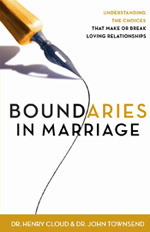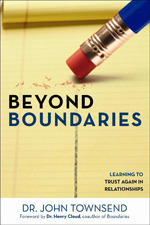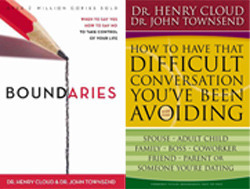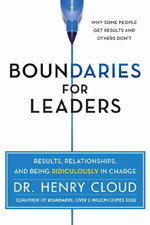Henry Cloud's Blog, page 28
October 12, 2014
Why Saying “I Love You” Is Not Enough
 George sat in my (Dr. Cloud’s) office, despondent. His wife, Janet, whom he loved deeply, had just moved out because he had lost another job. A very talented person, George seemed to have everything he needed for success. But he had lost several good jobs because of his irresponsibility and inability to follow through. Bosses loved the talent but hated the performance. And after several family disruptions because of his failures, Janet had had enough.
George sat in my (Dr. Cloud’s) office, despondent. His wife, Janet, whom he loved deeply, had just moved out because he had lost another job. A very talented person, George seemed to have everything he needed for success. But he had lost several good jobs because of his irresponsibility and inability to follow through. Bosses loved the talent but hated the performance. And after several family disruptions because of his failures, Janet had had enough.
“I love her so much,” George said to me. “Doesn’t she see that?”
“I believe that you love her,” I said. “But in reality, I don’t think that she does see your love. All she sees is the effect your behavior has had on her and the children, and she asks herself, ‘How can he love us and treat us this way?’ You cannot just say you love someone and not deliver. Love without the fruits of love is really not love in the end. She feels very unloved because of what you have put her through.”
If George was to have a chance of winning Janet back, it would not come through one more empty promise. He needed to develop boundaries to gain the self-control that would make him a responsible person. Janet was only going to believe in action, not just talk about love.
George had never been required to deliver the fruits of love when growing up. His parents were fine, hardworking people. But having gone through the Depression and a lifetime of hard work, they did not want George to have to struggle as they had. As a result, they indulged him and required very little work from him. When they did give him chores and responsibilities and he did not deliver, they would not discipline him, thinking that they wanted him to have “positive self-esteem” rather than the “guilt” with which they grew up. Consequently, he did not see any negative effect on his loved ones when he did not perform.
But marriage was different. He was now in a relationship in which the one he loved also had requirements for him, and things were falling apart. For George to become a truly loving per- son, one whose love actually made a difference in the lives of others, he was going to have to become a responsible person. In the end, love is as love does.
Moreover, loving people respect the boundaries of others. Have you ever been in a relationship with a person who could not hear the word no? How did you feel? Typically one feels controlled, manipulated, and resentful instead of respected and loved. A controlling person steps over the line and tries to possess the other. This does not feel very loving, no matter how much the offender says he cares.
Loving people are able to control their impulses. Many alcoholics, for example, have great love for their families. Their drinking greatly troubles them, and they feel horrendous guilt. But still they drink, and although, like George, they love, the effects of their lack of ability to say no to alcohol ends up destroying the relationships they care about. Many other impulse problems— such as sexual acting out, overspending, food or drug abuse, and rage attacks—end up destroying love as well. A lack of boundaries keeps these behaviors going.
A loving person recognizes that the world does not revolve around him or her. They consider the consequences of their behavior on people around them before they act. In psychological terms, they are not “egocentric”—thinking that they are all that matters and that people around them exist only to meet their demands and needs.
George’s irresponsibility was costing him his marriage and had cost him financial losses, chaos, a lack of stability, and unrealized dreams. But what is this thing we call responsibility? Many things come to mind, such as duty or obligations, reliability and dependability, or just “getting the job done.”
Responsibility is actually broader than this. We think of responsibility in terms of ownership. To take ownership of your life is ultimately to take control. Ownership is to truly possess your life and to know that you are accountable for your life— to God and others. When you take ownership, you realize that all aspects of your life are truly yours and only yours, and that no one is going to live your life for you.
People who are accountable see life as something that has been entrusted to them, and they know that they and they only will be responsible for what they do with it. To take ownership of these is to be a truly responsible person, the kind of person with whom everyone wants to have a relationship. A responsible person says, “My feelings are my problem,” or “My attitude is my problem.” In addition, the truly responsible adult realizes, “I made me do it, and I am responsible.” With that, there is hope for self-control to develop.
The post Why Saying “I Love You” Is Not Enough appeared first on Boundaries Books.
September 28, 2014
Setting Boundaries on Marital Submission
 Whenever I (Dr. Townsend) talk about a wife setting boundaries in marriage, someone asks about the biblical idea of submission. What follows is not a full treatise on submission, but some general issues you should keep in mind.
Whenever I (Dr. Townsend) talk about a wife setting boundaries in marriage, someone asks about the biblical idea of submission. What follows is not a full treatise on submission, but some general issues you should keep in mind.
First, both husbands and wives are supposed to practice submission, not just wives. “Submit to one another out of reverence for Christ” (see Ephesians 5:21). Submission is always the free choice of one party to another. Wives choose to submit to their husbands, and husbands choose to submit to their wives.
Christ’s relationship with the church is a picture of how a husband and wife should relate: “Now as the church submits to Christ, so also wives should submit to their husbands in everything. Husbands, love your wives, just as Christ loved the church and gave himself up for her to make her holy, cleansing her by the washing with water through the word, and to present her to himself as a radiant church, without stain or wrinkle or any other blemish, but holy and blameless” (see Ephesians 5:24–27).
Whenever submission issues are raised, the first question that needs to be asked is, What is the nature of the marital relationship? Is the husband’s relationship with his wife similar to Christ’s relationship with the church? Does she have free choice, or is she a slave “under the law”? Many marital problems arise when a husband tries to keep his wife “under the law,” and she feels all the emotions the Bible promises the law will bring: wrath, guilt, insecurity, and alienation (see Romans 4:15; Galatians 5:4).
Freedom is one issue that needs to be examined; grace is another. Is the husband’s relationship with his wife full of grace and unconditional love? Is she in a position of “no condemnation” as the church is (see Romans 8:1), or does her husband fail to “wash her” of all guilt? Usually husbands who quote Ephesians 5 turn their wives into slaves and condemn them for not submitting. If she incurs wrath or condemnation for not submitting, she and her husband do not have a grace-filled Christian marriage; they have a marriage “under the law.”
Often, in these situations, the husband is trying to get his wife to do something that either is hurtful or takes away her will. Both of these actions are sins against himself. “Husbands ought to love their wives as their own bodies. He who loves his wife loves himself. After all, no one ever hated his own body, but he feeds and cares for it, just as Christ does the church” (see Ephesians 5:28–29).
Given this, the idea of slave-like submission is impossible to hold. Christ never takes away our will or asks us to do something hurtful. He never pushes us past our limits. He never uses us as objects. Christ “gave himself up” for us. He takes care of us as he would his own body.
I have never seen a “submission problem” that did not have a controlling husband at its root. When the wife begins to set clear boundaries in marriage, the lack of Christlikeness in a controlling husband becomes evident because the wife is no longer enabling his immature behavior. She is confronting the truth and setting biblical limits on hurtful behavior. Often, when the wife sets boundaries, the husband begins to grow up.
 If your marriage is struggling or you want to make a great marriage even better, Boundaries in Marriage has the answers. Learn how to:
If your marriage is struggling or you want to make a great marriage even better, Boundaries in Marriage has the answers. Learn how to:
Transform your relationship into a haven of mutual love, caring, and appreciation.
Protect your marriage from intruders, whether parents, affairs, or addictions.
Handle conflict effectively without losing your voice in the relationship.
Develop a sense of closeness and respect that you’ve never felt before.
Click here to read a sample chapter, watch a free video, and purchase your copy today.
Image courtesy of David Castillo Dominici / FreeDigitalPhotos.net
The post Setting Boundaries on Marital Submission appeared first on Boundaries Books.
September 25, 2014
Why Set Boundaries with Bad People?
 Is it really necessary to set boundaries with “bad” people? Why draw the line if we’re their only hope to help them repent or change their ways? In 1 Corinthians 5:9-13, the Apostle Paul answers this perplexing question:
Is it really necessary to set boundaries with “bad” people? Why draw the line if we’re their only hope to help them repent or change their ways? In 1 Corinthians 5:9-13, the Apostle Paul answers this perplexing question:
I wrote to you in my letter not to associate with sexually immoral people — not at all meaning the people of this world who are immoral, or the greedy and swindlers, or idolaters. In that case you would have to leave this world. But now I am writing to you that you must not associate with anyone who claims to be a brother or a sister but is sexually immoral or greedy, an idolater or slanderer, a drunkard or swindler. Do not even eat with such people. What business is it of mine to judge those outside the church? Are you not to judge those inside? God will judge those outside. Expel the wicked person from among you.
The Bible contains admonitions for us to separate ourselves from fellow Christians who act in destructive ways (see Matthew 18:15 – 17; 1 Corinthians 5:9 – 13). If we do this, we are not being unloving. Separating ourselves protects love because we are taking a stand against things that destroy love.
We really can’t set limits “on” others — in that we cannot control them. What we can do is set limits on our own exposure to people who are behaving poorly; we can’t change them or make them behave correctly.
Our model is God. He does not set limits on people to force them to behave. God sets standards for people to follow, but people have the freedom to obey or disobey. If they choose to disobey, God allows them to suffer the consequences, but as we see in this passage, God does not give up on those who have failed. Heaven is a place for the repentant, and all are welcome.
 Find more insightful commentary from Drs. Henry Cloud and John Townsend, read the NIV Life Journey Bible, which combines the world’s most accessible Bible translation with exclusive boundaries teaching.
Find more insightful commentary from Drs. Henry Cloud and John Townsend, read the NIV Life Journey Bible, which combines the world’s most accessible Bible translation with exclusive boundaries teaching.
The post Why Set Boundaries with Bad People? appeared first on Boundaries Books.
September 21, 2014
The Truest Test of Trust
 The extent to which other people are concerned about their impact on you is the extent to which you can trust them. You trust them because you know it’s not just you looking after yourself; they are looking after you too.
The extent to which other people are concerned about their impact on you is the extent to which you can trust them. You trust them because you know it’s not just you looking after yourself; they are looking after you too.
For example, I (Dr. Townsend) was working with Steve and Lisa on learning this, so that they could connect on a deeper level. She had a tendency to criticize him in public. It wasn’t mean or harsh. It was more like he was always the idiot in her stories: how he dented the car, got the flight info wrong, let their daughter wrap him around her finger, and so on. He brought it up in our session. Here is how the conversation between the three of us went:
Steve: “Sometimes I dread going to a party with you because I know I’ll be the butt of one of your stories.”
Lisa: “I’m sorry, but it’s not that bad, and I don’t mean any harm.”
John: “Lisa, if I heard you tell me that, I would emotionally shut down right now.”
Steve: “Yes. I just did.”
Lisa: “Why? I was just explaining…”
John: “You were explaining. And you may even be right. Maybe he is oversensitive, but at this point that’s irrelevant.”
Lisa: “But I didn’t mean anything…”
John: “I know. You weren’t trying to bug him. But here is what I wanted you to say: ‘I didn’t know I had that effect. I don’t want you to dread going places with me. Tell me more about what happens; I want to understand this.’”
Lisa: “Steve, is that true? Is that what you want?”
Steve: “Yes.”
John: “Lisa, when you say things like ‘It’s not that bad’ and ‘I don’t mean any harm,’ it sounds as if you care more about him understanding you are a good person than you care about how you affect him with your jokes.”
Lisa: “I do want him to realize I have good motives.”
John: “More than you care about how you make him feel?”
Lisa (pause): “No.”
John: “Sure?”
Lisa: “Yes, I’m sure. But I just hate thinking that he will misunderstand me and think I’m a bad person.”
John: “Steve, why don’t you speak to her concern?”
Steve: “I may misunderstand you, Lisa. And if I do, let me know. But it really makes it better for me when you care about how you affect me; and it makes it worse for me when you care more about image management. I love you, and I think you are a great person.”
John: “Lisa, what if the tables were turned? For example, I know that you don’t like it when Steve gets really mad and is loud with you and the kids.”
Lisa: “But that’s a bad thing; he shouldn’t do that anyway.”
John: “I understand. But remember when I agreed with you about that, and he had to listen to how that scares you, and then he felt bad?”
Lisa: “He started crying.”
John: “He started crying. He had no idea what his anger was doing to you, and he felt a lot of remorse for putting you and the kids through those nightmares.”
Lisa: “I get it. I’m sorry, Honey. I want to get you like you got me.”
Steve was right. He married a good person. But Lisa had to come to terms with a problem many of us have: Sometimes, we value how we are perceived more than the impact we have on others. She got the message, however. Lisa was a mild case. Had she fought me and insisted she was innocent and never gotten to wondering about her impact on Steve, I would have been more concerned. But she got to the right place.
The point is that you and I need to be people who care about how we affect others and require that of those who matter to us. To clarify all this, here are some additional examples of caring and uncaring responses people have in various situations:
Situation: A husband is overspending, and his wife mentions the problem to him.
Uncaring response: I have a right to the money as much as you do. I can choose, and you need to trust me.
Caring response: I didn’t know how much the spending scared you. Let’s look at the budget and figure something out.
Situation: An adult child is living with his parents, and it’s time to get a job and move out.
Uncaring response: Get off my back, you guys are so unsupportive!
Caring response: I appreciate the break you’re giving me. Let’s come up with a launch plan that works.
Situation: A wife is chronically late, and the husband has brought it up.
Uncaring response: You’re always micromanaging me.
Caring response: I guess it’s hard when I tell you I’ll be home at 6:00 for dinner, and it’s always 6:45.
Don’t give up hope if you are getting uncaring responses. It may not be a sign to find the exit door. The person you’re interested in connecting with might just need a little coaching. Then they understand that it’s important to you to know how they affect you. But don’t take any more steps toward vulnerability until you talk about this. If it’s a little defensiveness or cluelessness and the lights come on when you talk about it, and their behavior begins to change, then they pass the test of trust and it’s safe to proceed.
 If you’ve been hurt by a bad relationship, you can prevent the past from repeating itself. Read Beyond Boundaries to discover how to tell who you can trust and learn the keys to know when you’re in a healthy relationship.
If you’ve been hurt by a bad relationship, you can prevent the past from repeating itself. Read Beyond Boundaries to discover how to tell who you can trust and learn the keys to know when you’re in a healthy relationship.
Trust image courtesy of Stuart Miles at FreeDigitalPhotos.net
The post The Truest Test of Trust appeared first on Boundaries Books.
September 18, 2014
The Blessing of Confrontation
Ezekiel 3:17-21:
“At the end of seven days the word of the Lord came to me (Ezekiel): “Son of man, I have made you a watchman for the people of Israel; so hear the word I speak and give them warning from me. When I say to a wicked person, ‘You will surely die,’ and you do not warn them or speak out to dissuade them from their evil ways in order to save their life, that wicked person will die for a their sin, and I will hold you accountable for their blood. But if you do warn the wicked person and they do not turn from their wickedness or from their evil ways, they will die for their sin; but you will have saved yourself.
Again, when a righteous person turns from their righteousness and does evil, and I put a stumbling block before them, they will die. Since you did not warn them, they will die for their sin. The righteous things that person did will not be remembered, and I will hold you accountable for their blood. But if you do warn the righteous person not to sin and they do not sin, they will surely live because they took warning, and you will have saved yourself.”
We all have a duty to warn others and show them their sins, not to judge them but to help save them from themselves. God uses us to help others when they are off the path of righteousness and growth. If we neglect to bring problems to each other’s attention, we bear some responsibility for the outcome. When we confront others in the right way, they have a choice and may ignore our warning. But we will not have participated in their destructiveness. Even more, they may remember our words at a later time and act accordingly, and our words will have borne fruit.
For example, when modern psychological researchers began studying addictions, they realized that most of the time addicts do not live in a vacuum. Instead, they live in a system of relationships. Some of those relationships serve to enable their behavior, that is, someone unwittingly tries to keep the addict from suffering the consequences and effects of the addiction. In an attempt to help, the enabler rescues the addict from the discomfort that would drive the person to face and solve the problem. When the enabler becomes aware of this and allows the addict to feel pain, healing can begin.
Be a part of the solution and, in love, warn those who are veering too close to the edge. It could save a life.
 Find more insightful commentary from Drs. Henry Cloud and John Townsend, read the NIV Life Journey Bible, which combines the world’s most accessible Bible translation with exclusive boundaries teaching.
Find more insightful commentary from Drs. Henry Cloud and John Townsend, read the NIV Life Journey Bible, which combines the world’s most accessible Bible translation with exclusive boundaries teaching.
The post The Blessing of Confrontation appeared first on Boundaries Books.
September 14, 2014
Transform from People-Pleaser to Respect-Receiver
 A woman complained to me (Dr. Cloud) about a coworker who would always interrupt her while she was trying to get her job done. She acted as if her tendency to be behind in her work was her coworker’s fault.
A woman complained to me (Dr. Cloud) about a coworker who would always interrupt her while she was trying to get her job done. She acted as if her tendency to be behind in her work was her coworker’s fault.
“Why do you talk to her?” I asked.
“What do you mean?” she replied.
“When she comes in and interrupts, why do you get into a conversation with her?”
“Well, I have to. She is standing there talking.”
“Why don’t you just tell her that you have work to do, or close your door and put up a ‘Do Not Disturb’ sign?”
The woman looked at me with a blank stare. To have choices and to have control of her own behavior was a concept that hadn’t occurred to her. She felt that if something happened “to her,” then that was the way it had to be. There was nothing she could do to change it.
When I suggested that she had many choices, she quizzed me about them. I gave her five or six suggestions, from talking to the woman about the problem, to talking to a supervisor, to asking to be moved to another area. This was a totally new way of thinking for her; she had never learned that she was free to make choices in relationships and in life.
Have you ever been in a relationship with a “victim”? Victims feel as if they have no choices in life. Life is something that happens to them, and whatever comes their way is their lot.
Joe was such a victim. His company was imposing some new policies that he found difficult to handle, and he was very depressed about the changes.
“What are you going to do about it?” I asked him.
“What do you mean, do about it?” Joe asked.
“I mean what are you going to do about your being stuck in something you don’t like?”
He just looked at me. It took a long time before he realized that he could choose to get his resume out to some other firms and not be a victim to the fifty-hour workweek he hated.
Adults and children raised with good boundaries learn that they are not only responsible for their lives, but also free to live their lives any way they choose, as long as they take responsibility for their choices. For the responsible adult, the sky is the limit.
We live in a society of people-pleasers and victims. People today act as if they have no choices in life and that everything should be done for them. If it’s not, they can’t do it themselves or make changes. This presents a big opportunity for the future: If you learn to take control of your own life, you will be so far ahead of everyone else that success in life is all but guaranteed!
 If people-pleasing is a struggle you’d like to overcome, the Boundaries DVD Video Study Kit can help. This resource is one of the most widely-used resources across America and designed for individual and group study.
If people-pleasing is a struggle you’d like to overcome, the Boundaries DVD Video Study Kit can help. This resource is one of the most widely-used resources across America and designed for individual and group study.
Click here for details and watch a sample video.
The post Transform from People-Pleaser to Respect-Receiver appeared first on Boundaries Books.
September 11, 2014
How Do You Know If It’s Time to End a Friendship?
Today, we want to highlight a great video by Dr. Cloud that addresses the controversial question, “How do you know if it’s time to end a friendship?” He talks about who do you allow into the inner circle of your life and how to determine when to set boundaries with those close to you.
Take the next 8 minutes to watch this video and learn an important secret that affects all of your relationships.
Click on the picture or this link to watch the video
To watch more of these insightful videos, click here.
 Learn how to build rewarding friendships and protect yourself from toxic relationships with the bestselling books, Boundaries and How to Have That Difficult Conversation You’ve Been Avoiding.
Learn how to build rewarding friendships and protect yourself from toxic relationships with the bestselling books, Boundaries and How to Have That Difficult Conversation You’ve Been Avoiding.
The post How Do You Know If It’s Time to End a Friendship? appeared first on Boundaries Books.
September 8, 2014
Why Positive People Outshine Negative Thinkers
 I (Dr. Cloud) was addressing an organization in the aftermath of a financial meltdown. We discussed why so many people were feeling down, defeated, and unable to perform at the levels they were used to. (It is amazing how just knowing that there is a reason for why you feel the way you do can be helpful. I wanted them to know that they weren’t crazy.) But then, I heard the words that I never want to hear…
I (Dr. Cloud) was addressing an organization in the aftermath of a financial meltdown. We discussed why so many people were feeling down, defeated, and unable to perform at the levels they were used to. (It is amazing how just knowing that there is a reason for why you feel the way you do can be helpful. I wanted them to know that they weren’t crazy.) But then, I heard the words that I never want to hear…
“So, what you are telling us is that we are basically screwed,” an attendee said. “We are just going to feel this way until the economy is different. This is just the new normal.”
“Yes, you are right,” I said. “This has become the new normal. And that is exactly your problem.”
“What do you mean?” she asked.
“Your creative drives, the energy that you summon to go out and win, have shut down,” I said. “You feel that since you can’t control the economy, you can’t control anything. And now that you have been feeling that way for a while, your brain has tricked you into thinking that that is the way it really is, that there is nothing you can do about it. And it has become, as you say, ‘normal’ to think that way.”
I went on to explain that the thing she was calling the “new normal” was a state inside her head. “It has become normal to you to feel that there is nothing you can do.”
“That is how I feel,” she said. “I just find myself not knowing what to do.”
“Exactly,” I said. “But if anyone knows what to do, it is probably you. You have been a leader at this company, and in this industry, for over a decade and a very high performer. If you can’t figure out something to do, who can?”
What I am about to tell you is going to sound so simplistic that you might miss the profound value that it has. But you have to just trust me that its effects can be incredible for your life.
First, take a piece of paper and draw a line down the middle of the page, creating two columns. In column number one, write down all of the things that you have no control over that are making your business difficult, such as the economy, the stock market, your customers’ finances, the banks, your boss, the parent company, the health care cost increase, the company’s overall budget, the board, the elections, the newscasts that hurt your business, etc. Those are the things that you have no control over that truly are affecting you. Get everything in that column that you can think of.
Next, I want you to really worry about these items, even as a group. Obsess over them. Ruminate. Dwell. Think it through over and over…FOR ABOUT FIVE OR TEN MINUTES. Then, I want you to set the list aside until the next day when you can do the same thing all over again. The reason I suggest that you do this is that you need to! You need to worry about this stuff, and get into “Ain’t it awful!” for a few minutes because it is! It is really bad stuff. I do not want you to be in denial. Besides, your brain needs to complete the loop of making sure that you know how bad it is. Otherwise, it will continue to remind you of it, probably in the middle of the night or every time you have some good idea. So, focus on it. But…only for about five or ten minutes.
Next, after you have had your “worry time,” I want you to draw a circle around that time block and stop thinking about that column. Quarantine it. Put a boundary around it. If you find it helpful, put a red STOP sign on it. No more thinking about those things.
Next, and most important, let’s go to the second column. In this column, I want you to write down everything that you DO have control over that can drive results. This need not be a final list. You can always add more activities as they occur to you and your team, as they probably will change as time goes on. But once you have the list in the initial form, I want you to focus on it every single day. Make prioritizing and doing those activities the primary focus of every day. Work the list.
What makes this simple exercise so powerful is that it speaks directly to our brains’ executive functions and our desire to have control. The brain begins to “attend” to the actual activities that it can control, and it “inhibits” the thoughts, behaviors, and information that interfere with positive actions. The process of doing this, individually and collectively, builds up working memory and creates those positive, action-oriented behaviors that lead to better results, new products, new partnerships, new customers, and a lot more fun. The brain begins to get out of the mud.
Optimism is powerful. But, its resurrection cannot take hold until a sense of control is regained.
 Is negative thinking overwhelming your ability to get results in your personal life, your organization, or your workplace? Discover why some people get results and others don’t in Boundaries for Leaders by Dr. Henry Cloud.
Is negative thinking overwhelming your ability to get results in your personal life, your organization, or your workplace? Discover why some people get results and others don’t in Boundaries for Leaders by Dr. Henry Cloud.
Image courtesy of Ambro from FreeDigitalPhotos.net
The post Why Positive People Outshine Negative Thinkers appeared first on Boundaries Books.
September 4, 2014
Do Opposites Really Attract?
 Do opposites really attract? And, is it wise to fall in love with someone who seems so different? One reason people are initially drawn to an individual with opposite traits is a pretty healthy one. It is that we are drawn to those who possess what we do not, so that we can internalize and own that trait for ourselves. This is a good thing, as that is how God designed the growth process. However, dating is not a good arena in which to develop oneself in a specific and important aspect of growth.
Do opposites really attract? And, is it wise to fall in love with someone who seems so different? One reason people are initially drawn to an individual with opposite traits is a pretty healthy one. It is that we are drawn to those who possess what we do not, so that we can internalize and own that trait for ourselves. This is a good thing, as that is how God designed the growth process. However, dating is not a good arena in which to develop oneself in a specific and important aspect of growth.
We should use and appreciate the abilities of those who have what we don’t. However, the danger occurs when we make opposing styles or abilities a basis for relationship. At the outset of the relationship, this may seem like a good thing. You are complementing each other. You each provide what the other needs. You are stimulated by the other’s different point of view. However, the danger of going for an opposite-type person is this: opposite-driven relationships often confuse dependency with true love.
Find out why and read about a couple who successfully dealt with this problem in our highlighted Free Resource of the Week: Beware When Opposites Attract.
The post Do Opposites Really Attract? appeared first on Boundaries Books.
September 1, 2014
8 Must-Have Moments to Make Love Last
 One of my (Dr. Townsend’s) closest friends, Chuck, is a talented songwriter. When we were college buddies, I was visiting him in his room one day. Chuck picked up his guitar and said, “Want to hear my new love song?” I said I did, and he sang me the following: “I love you. Always have, always will. What’s your name?”
One of my (Dr. Townsend’s) closest friends, Chuck, is a talented songwriter. When we were college buddies, I was visiting him in his room one day. Chuck picked up his guitar and said, “Want to hear my new love song?” I said I did, and he sang me the following: “I love you. Always have, always will. What’s your name?”
I never found out whether Chuck was referring to his dating history or simply observing college romantic life, but I knew I could identify with his lyrics. I understood the ritual of intense professions of undying love, followed by the realization of utter ignorance about one’s beloved. In other words, too much, too fast.
Relationships grow in a healthy manner only as they undergo experiences, and there is no shortcut to experiences. In other words, we only “know” each other to the extent that we have experience with each other. We can know facts about the person we are dating: their friends, job, hobbies, and so forth. But that doesn’t mean we “know” them as a person. That kind of “knowing” cannot come from reading a file on someone.
Experience requires time. It is simply impossible to get enough experiences under your belt without spending a lot of time dealing with the relationship. Here are eight examples of must-have time-consuming activities on the road to becoming committed to someone:
Entering each other’s worlds of work, hobbies, worship, and service
Having enough talks to safely open up with each other
Meeting and spending time with each other’s friends
Understanding each other’s strengths and weaknesses
Going over basic values of what is important in life to each other
Getting to know each other’s families
Spending time away from each other to think through the relationship, alone and with friends
Learning your best style of disagreement and conflict management
It’s hard to imagine doing all that in a few months, because it can’t be done. Yet, so many dreamy-eyed couples will say to their friends, “You don’t understand. It’s as if we’ve known each other all our lives. We were soul mates from the first meeting.” And, while I know people who have met and married quickly, I think their success is due more to their own character than to going through the process the right way.
For example, my Aunt Jonnie and Uncle Walton have been married over fifty years. I have seen his framed proposal of marriage to her. He wrote it to her when they were both in kindergarten! I guess they both knew each other was “The One” pretty early on in life. But I don’t think they would attribute their successful marriage to how early they committed. Knowing and observing them all my life, I think they would instead talk about love, the right values, their faith, and being able to go through good times and bad together.
There is no microwave dating that makes any sense. Go through the seasons of life with the person you believe might be the one God has meant for you.
 Get more helpful advice to build the best dating relationship and find the love of your life in Boundaries in Dating by Dr. John Townsend and Dr. Henry Cloud.
Get more helpful advice to build the best dating relationship and find the love of your life in Boundaries in Dating by Dr. John Townsend and Dr. Henry Cloud.
Image courtesy of stockimages at FreeDigitalPhotos.net
The post 8 Must-Have Moments to Make Love Last appeared first on Boundaries Books.




